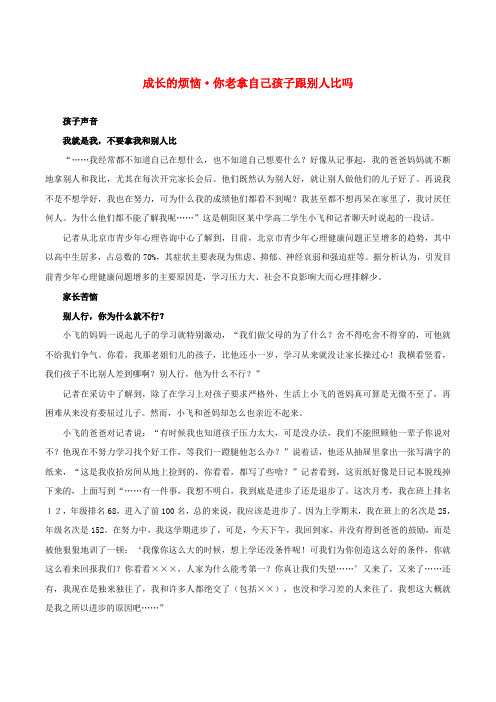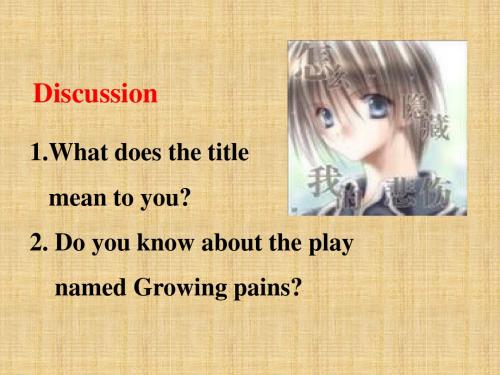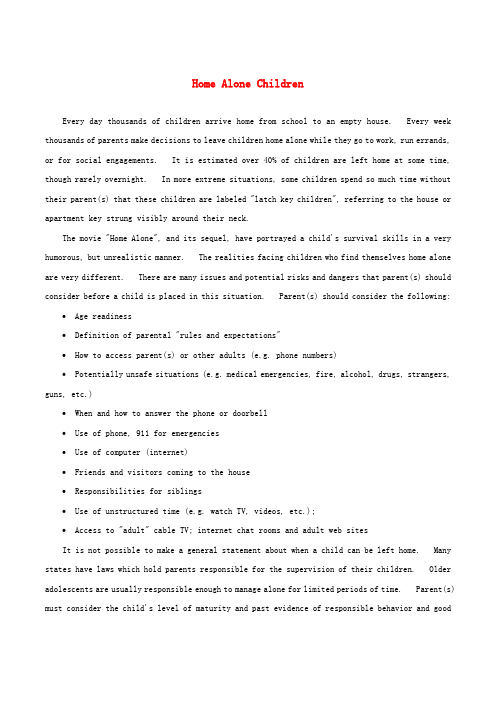【知识学习】Unit 2 “Growing Pains”-Welcome to this unit教
- 格式:doc
- 大小:16.00 KB
- 文档页数:3


成长的烦恼·你老拿自己孩子跟别人比吗孩子声音我就是我,不要拿我和别人比“……我经常都不知道自己在想什么,也不知道自己想要什么?好像从记事起,我的爸爸妈妈就不断地拿别人和我比,尤其在每次开完家长会后。
他们既然认为别人好,就让别人做他们的儿子好了。
再说我不是不想学好,我也在努力,可为什么我的成绩他们都看不到呢?我甚至都不想再呆在家里了,我讨厌任何人。
为什么他们都不能了解我呢……”这是朝阳区某中学高二学生小飞和记者聊天时说起的一段话。
记者从北京市青少年心理咨询中心了解到,目前,北京市青少年心理健康问题正呈增多的趋势,其中以高中生居多,占总数的70%,其症状主要表现为焦虑、抑郁、神经哀弱和强迫症等。
据分析认为,引发目前青少年心理健康问题增多的主要原因是,学习压力大、社会不良影响大而心理排解少。
家长苦恼别人行,你为什么就不行?小飞的妈妈一说起儿子的学习就特别激动,“我们做父母的为了什么?舍不得吃舍不得穿的,可他就不给我们争气。
你看,我那老姐们儿的孩子,比他还小一岁,学习从来就没让家长操过心!我横看竖看,我们孩子不比别人差到哪啊?别人行,他为什么不行?”记者在采访中了解到,除了在学习上对孩子要求严格外,生活上小飞的爸妈真可算是无微不至了,再困难从来没有委屈过儿子。
然而,小飞和爸妈却怎么也亲近不起来。
小飞的爸爸对记者说:“有时候我也知道孩子压力太大,可是没办法,我们不能照顾他一辈子你说对不?他现在不努力学习找个好工作,等我们一蹬腿他怎么办?”说着话,他还从抽屉里拿出一张写满字的纸来,“这是我收拾房间从地上捡到的,你看看,都写了些啥?”记者看到,这页纸好像是日记本脱线掉下来的,上面写到“……有一件事,我想不明白,我到底是进步了还是退步了。
这次月考,我在班上排名12,年级排名68,进入了前100名,总的来说,我应该是进步了。
因为上学期末,我在班上的名次是25,年级名次是152。
在努力中,我这学期进步了,可是,今天下午,我回到家,并没有得到爸爸的鼓励,而是被他狠狠地训了一顿:‘我像你这么大的时候,想上学还没条件呢!可我们为你创造这么好的条件,你就这么着来回报我们?你看看×××,人家为什么能考第一?你真让我们失望……’又来了,又来了……还有,我现在是独来独往了,我和许多人都绝交了(包括××),也没和学习差的人来往了。


Unit2 Growing Pains-Welcome to this unit教案teaching objectives:1. to introduce and develop the theme of growing pains.2. to develop speaking ability by talking about families and problems that happen between teenagers and parents.3. to know more about classmates and their families.important and difficult points:1. get students to understand what growing pains means.2. make students know the relationship between parents and their teenage children in the usa.3. help students to form a positive attitude towards relationships between their parents and them.teaching procedures:step 1: brainstorming1. do you love your parents? do you think you show respect to your parents?2. do you sometimes quarrel with your parents? how do arguments usually happen? will you give examples of kinds of problems you sometimes have with your parents.some parents may interfere in their children's lives and try to influence their decisions about their future career or study plans. parents may want to make decisions for their children and also force them into doing things they don't want to, such as household chores or extra study. some parents don't always trust that their child is telling the truth. they may ask lots of questions about a child's social activities or the reason why they are late coming home, etc.some of the problems we have been discussing are quite common in families nowadays. what should you do to deal with these problems? do you nowadays always listen to your parents' instructions? do you always explain yourselves to your parents and resolve problems peacefully? or do you disobey your parents and quarrel with them about your decisions? in every family there are certain issues that cause problems and arguments. what are the most common causes of family arguments? are these daily conflicts over doing homework, doing household chores and going to bed and getting up on time? or are they over bigger issues such as study, careers, university and making friends?step 2: discussing and practicing1. look at each picture carefully. there are four pictures here. first of all, i'd like you to imagine the situation and try to describe it with your own words.(the teacher can show an example to students by describing the first picture.)last sunday, after leaving school, li ping went home feeling extremely tired. he wanted to have a good rest and relax. when his parents said hello to him, he was so impatient that he didn't say anything and went straight to his own bedroom. though his parents were very confused, they didn't ask him why and continued with the cooking. after a while, loud music came from li ping's bedroom. his mother was very angry and she rushed into his room.共3页,当前第1页123。


Home Alone ChildrenEvery day thousands of children arrive home from school to an empty house. Every week thousands of parents make decisions to leave children home alone while they go to work, run errands, or for social engagements. It is estimated over 40% of children are left home at some time, though rarely overnight. In more extreme situations, some children spend so much time without their parent(s) that these children are labeled "latch key children", referring to the house or apartment key strung visibly around their neck.The movie "Home Alone", and its sequel, have portrayed a child's survival skills in a very humorous, but unrealistic manner. The realities facing children who find themselves home alone are very different. There are many issues and potential risks and dangers that parent(s) should consider before a child is placed in this situation. Parent(s) should consider the following: ∙Age readiness∙Definition of parental "rules and expectations"∙How to access parent(s) or other adults (e.g. phone numbers)∙Potentially unsafe situations (e.g. medical emergencies, fire, alcohol, drugs, strangers, guns, etc.)∙When and how to answer the phone or doorbell∙Use of phone, 911 for emergencies∙Use of computer (internet)∙Friends and visitors coming to the house∙Responsibilities for siblings∙Use of unstructured time (e.g. watch TV, videos, etc.);∙Access to "adult" cable TV; internet chat rooms and adult web sitesIt is not possible to make a general statement about when a child can be left home. Many states have laws which hold parents responsible for the supervision of their children. Older adolescents are usually responsible enough to manage alone for limited periods of time. Parent(s) must consider the child's level of maturity and past evidence of responsible behavior and goodjudgment. When a child is ready to be left alone, a graduated approach should be used starting with a very short period of time (e.g.1 hour).Parent(s) should talk with their youngsters to prepare them for each of the issues or potential problems listed above. In addition, parent(s) should strive to make their home as safe as possible from obvious dangers and hazards and rehearse the developed "emergency plan" with their children. Parents should also teach their child important safety precautions (i.e. locking the door, dealing with strangers or visitors who come to the house, use of the stove, etc.) Being home alone can be a frightening and potentially dangerous situation for many children and adolescents. Parents should strive to limit the times when children are home alone. Parents should prepare their children in advance for how to deal with situations that may arise.。
你会和你的孩子交朋友吗“爸妈问话不耐烦,只愿独居小房间”。
据广东某中学的一份调查表明,在接受抽样问卷的232名高一至高三学生中,有近7成高中学生与家庭成员间的“亲情淡化”。
他们从不主动与家人谈心,或只是偶尔才跟家人谈心。
而约8成的家长,感觉与孩子存在“距离”与“隔膜”,有时甚至无从沟通。
现代家长都渴望与孩子交朋友,但事实却非人愿。
为何你和孩子成不了朋友?和孩子交朋友你有何好办法?用心灵去接近十四五岁到十八九岁年龄段的孩子有了点独立精神,对父母不像小时候那么依赖了,有时对父母的言语表现出逆反心理。
这时,父母只要和孩子友好、平等相处,用心灵接近孩子,还是能和孩子交朋友的。
我觉得尊重孩子的独立个性很重要。
我妹妹出国前留下的衣服,女儿可以穿时,我让她穿,她坚决不穿。
开始我很生气,以前我给啥她穿啥,现在为啥犟头倔脑?后来她讲出了自己的想法,她说这是上班穿的衣服,不适合学生穿。
我第一次觉得女儿有了自己的想法。
仔细想想,孩子很听话不见得好,有独立判断能力倒是好事情。
只有引导其个性发展,她才能超越我们。
后来我让她自己安排学习计划,很多事情上放“权”给她,这倒培养了她的责任心。
要和孩子交朋友,要多站在他们的立场想问题,体会他们年龄状况下的一种心态,才能做到以心交流。
比如像早恋等问题,我都能站在他们的角度分析给他们听。
只有在同一立场上规劝才有效。
有一次,老师反映,我女儿上课吃泡泡糖。
我先问明原因,才知老师怀疑她抄同桌作业,暗地里调查她,她很委屈,就在该老师的课上故意捣蛋。
我感受到她的苦恼,站在她的角度劝她,你只有一趟趟用好成绩给老师看,老师才明白真相。
而用吃泡泡糖这种无聊办法,更让老师觉得你不聪明。
后来她果然这科成绩出类拔萃。
学点“I服了YOU”小孩子为什么不乐意跟自己父母说心里话?那是觉得上一辈的人一定不会理解自己的处境和心情。
而一些父母,老是固执地抓着过去的“育儿”道理不放,没考虑过“代沟”出现的原因和解决方法。